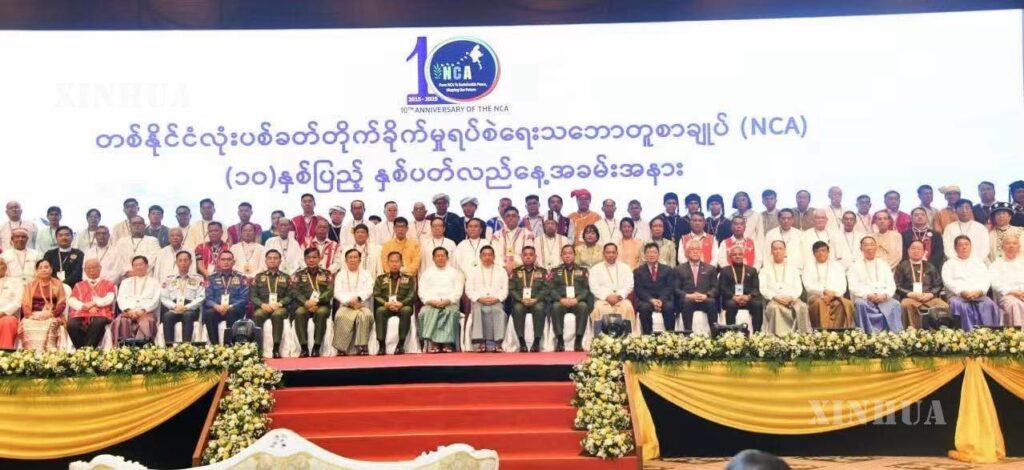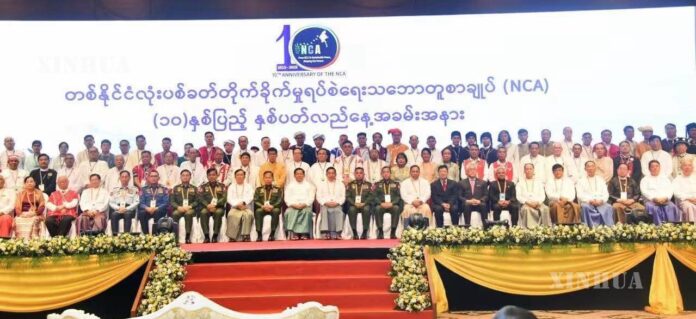The State Administration Council (SAC) held a ceremony in Nay Pyi Taw on October 15 to mark the 10th anniversary of the signing of the Nationwide Ceasefire Agreement (NCA).
However, ethnic armed organizations (EAOs) expressed distrust toward the peace talks led by the military leader himself.

“The so-called peace invited by the military is only meant to serve their political interests—to interfere in politics and secure their power. Their ultimate goal is the disarmament of the armed groups. Moreover, the post-2021 political situation has nothing to do with the NCA path anymore,” said U Aung San Myint, Secretary of the Karenni National Progressive Party (KNPP).
Deputy Commander-in-Chief Yar Pyae, who chairs the National Solidarity and Peace Negotiation Committee (NSPNC), stated that the military is ready for peace talks. The military leader himself had previously called on Ethnic Revolutionary Organizations (EROs) and People’s Defense Forces (PDFs) to disarm and engage in political dialogue during his Armed Forces Day speech earlier this year.
“Peace talks led by the military are not acceptable to anyone. It’s true that we need to resolve our current conflicts collectively, but when the military leads the process, sets the political agenda, and limits the discussions to its preferred topics, such talks can never solve the country’s political crisis. Even in earlier peace processes, the military shaped discussions to fit its desired political model. Moreover, all dialogues took place under the 2008 Constitution drafted by the military. Despite years of negotiation and effort, the results remain the same—everything is still bound by that 2008 framework. If peace talks are again confined within that framework, no one will accept such an outcome,” said Ye Baw Than Khe, Chair of the All Burma Students’ Democratic Front (ABSDF).
Before the NCA, during the era of the former junta, ethnic armed organizations were pressured to transform into Border Guard Forces (BGFs) or People’s Militias under military control. This forced transformation led to the absorption of groups such as Zahkung Ting Ying’s New Democratic Army–Kachin (NDA-K), the Karenni National People’s Liberation Front (KNPLF), and some units of the Democratic Karen Benevolent Army (DKBA) into BGFs.
The Karen National Union (KNU) was also pressured to establish a political party and contest in elections if it wished to continue political engagement. Laws prohibiting political parties from maintaining armed forces further blocked their revolutionary activities. The military launched a major offensive against the Myanmar National Democratic Alliance Army (MNDAA) in 2009 after it refused to transform into a BGF.
“Before 2001, they were in a stronger position militarily and politically. They invited us to talks from a position of superiority and only discussed what they wanted. Their main focus was disarmament, not genuine political dialogue. But the situation today, after 2001, is no longer the same. If they truly want to resolve the conflict between ethnic groups and the Burmese political system, they must start by understanding what ethnic groups really want—the fundamental issues—before anything else,” U Aung San Myint added.
EAOs pointed out that the military’s current peace offer is merely a façade, and as long as this continues, the internal conflict will only prolong further.

